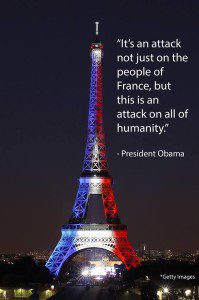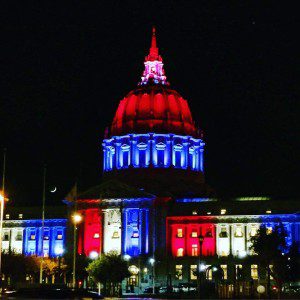The horrifying events in Paris tonight are almost beyond comprehension. While we don’t know much more than the specific facts on the ground–coordinated attacks, suicide bombers at Le Stade de France, drive-by shootings at a Cambodian restaurant, the massacre at Bataclan, at least 150 are dead–I’ve been thinking all day about this still unfolding tragedy.
It’s still early and we don’t know much about who is involved or why. As with the recent destruction of the Russian charter plane, I doubt that this would be the work of ISIS. I just don’t buy that they’d want countries like France or the US to step involvement in Syria. The coordination and methods seem most like the work of al Qaeda. Many observers have been waiting for al Qaeda to carry out a high profile attack, if only to steal some of the “spotlight” from ISIS who has been dominating the headlines and the recruiting channels of late.
It’s also possible–and I’ve seen some reports supporting this–that it’s the work of so-called “foreign fighters”, French citizens who traveled to Syria for training and combat, only to return under the guise of their passports. States have been worrying about “foreign fighters” for some time now, fearing an influx of dangerous radicals with combat and explosives training who would be able to travel more or less freely due to their status as citizens. The sophistication and synchronization of the attacks make me wary that it could be carried out by a few individuals on their own; if it turns out to be the case, it will likely result in states reevaluating their policies towards those returning from ISIS land. France generally arrests anyone who traveled to Syria, but other countries prefer to screen for risk or try to de-radicalize the returnees.
If it is indeed the work of the ISIS core, it’s going to force the US and the rest of the West to rethink policy in Syria. It seems unlikely that this attack or any others would lead the international community to back off of ISIS.
Again, it’s early. Presumably we’ll know more soon. For now, it’s enough to remember that the world can be a dangerous, terrible place. And that is why we study and teach about dangerous, terrible things. At times like this I think of my students who have gone on to work in government, the intelligence community, those studying security policy at Georgetown or George Washington, and I hope that I have adequately prepared them to face and analyze these threats.
UPDATE: I’m not a Twitter user, but I did find this from Richard Engel of NBC News quoting a US “counter-terrorism” official naming al Qaeda or an al Qaeda affiliate (like AQAP) as the most likely suspect given the level of coordination.
UPDATE 2: French President Francois Hollande is blaming ISIS for the attacks, and ISIS has claimed responsibility. If ISIS is indeed responsible, this attack represents major change in their strategy. The difference between ISIS and al Qaeda has been that al Qaeda focused on attacking the “far enemy” who propped up illegitimate governments ruling Muslims while ISIS focused on building a state right away. Given that focus ISIS had not carried out large scale attacks like this, presumably because they didn’t want states coming in to Syria and Iraq to destroy their territorial control. If it is indeed ISIS it signals a marked change in their strategy and a very scary one. It might be a response to a worsening situation on the ground (although not the recent seizure of Sinjar and Route 16 by the Kurds or the droning of “Jihadi John”. An operation this sophisticated would have been planned well before the events of the past few days, although it’s possible those events do explain the specific timing.). ISIS has depended on territorial expansion and control as a signal of their success; US and coalition air strikes seems to have blunted ISIS’s territorial expansion and even pushed it back in some places, even if they haven’t been able to dent the flow of recruits. If ISIS feels that it is losing on the ground or even not winning sufficiently, it could turn to a more provocative strategy in order to maintain its appeal in the jihadi world. While it’s too soon to say whether France, the US, and other western powers will step up their involvement in Syria, President Hollande has described the attacks as an “act of war” and promised a “pitiless” and “merciless” response.
Sadly, the big winner (if such a word can be used in this situation) might just be Syrian President Assad, who has long been castigating the western powers for ignoring the problem of ISIS and focusing instead on helping rebels unseat his regime. It seems likely that, at the very least, France and other countries currently carrying out airstrikes in Syria will indeed focus more on ISIS, even if it means buoying the Assad regime.
Seth Weinberger is Associate Professor of Politics and Government at the University of Puget Sound. He received his B.A. (1993) in political philosophy from the University of Chicago, an M.A. (1995) in Security Studies from Georgetown University, and an M.A. (2000) and Ph.D. (2005) in political science from Duke University. He teaches courses on international relations, U.S. foreign policy, international security, terrorism, constitutional law, and political philosophy. His book, Restoring the Balance: War Powers in an Age of Terror was published by Praeger Press in 2009. His recently published articles include “Enemies Among Us: The Targeted Killing of American Members of al Qaeda and the Need for Congressional Leadership” in the Georgetown Global Security Studies Review (Spring 2013) and “Institutional Signals: The Political Dimension of International Competition Law Harmonization” (with Geoffrey A. Manne) in The Anti-Trust Bulletin (57, no. 3). His current research focuses on congressional-executive war powers in the on-going armed conflict against al Qaeda. In 2011, Professor Weinberger received the Thomas A. Davis Teaching Excellence Award.



Here and elsewhere you are trying to analyse an essentially apocalyptic world vision as a set of rational calculations. From Iraq/Syria ISIS has attacked Shi’a, Yezidis, Kurds, Ba’athists, fellow Sunni radicals (an Nusra), Saudi Arabia, Turkey, Bahrain, Kuwait…in short, everyone. This presumably makes some sort of sense from their viewpoint, but that viewpoint shows precious little evidence that calculations about consequences, or the longer-term survival of the “caliphate” play much part.
We’ve been here before. It made no sense for Branch Dravidians to defy the US government, or for Germany to devote scarce resources to killing Jews even as the Red Army closed in, or for the people at Jonestown to drink the cool-aid, or for messianic factions to throw each other off the walls of Jerusalem as the Roman army watched. That ISIS has claimed this act as its own tells us that it fits with their outlook.
Can it not be both, both the apocalyptic world vision and the pragmatic? It’s not hard to imagine some pope conferring with a handful of senior cardinals a few centuries ago and having some of those advisers be more concerned with the prosperity and survival of the Papal States and their own influence and wealth above all other concern, while others might put first and foremost their beliefs about about heaven’s will and what would most benefit the church as a whole. The mercenary and the would-be martyr aren’t mutually exclusive (Rick and Victor Lazlo, Han Solo and Princess Leia, Nazi fanatics and German career officers…)
Fair enough. Even millenarians need at least one foot in the real world. But ISIS doesn’t have a pope, or a college, or bishops. It has a centre in Raqqa, a current leader, and an inner circle, but then it becomes a set of local affiliates. ISIS has attacked everyone (literally) around it, even those whose neutrality or benevolence is of real material importance (eg Turkey and Saudi). Affiliates have conducted attacks in Bangladesh, Pakistan, Egypt, Nigeria…
If, say, a group in North Dakota blows up a Family Planning clinic then we do not look to some carefully-laid plan in Westboro, even if the latter emits approving noises.